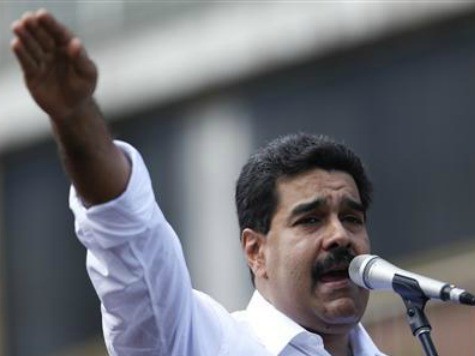Venezuelan President Nicolás Maduro has condemned the moderate opposition for ending talks with the government in protest of the National Guard’s continued violent repression of protesters. The dissolution of talks, he said on his radio program, was the result of threats from the Tea Party and an “extremist” lobby in Miami.
“I know the pressures that their families are facing. I know the pressures exerted from the extremist sectors of Miami,” Maduro noted on his program In Touch with Maduro. Maduro suggested that the “great pressures” on the Democratic Unity Table (MUD) coalition came from the United States, and that the Tea Party conspired in Washington to change the socialist system in Venezuela.
“I know they have received threats and been at the receiving end of the power of money,” he explained, “I know the pressures from the extremist Tea Party lobby.” He blamed “Noriega and the other guy; I won’t name him.” He was likely referring to Sen. Marco Rubio, someone Maduro has previously described as “the craziest of the crazies.” Maduro lamented, “They spend all their time conspiring in Washington to impose their madness against Venezuela, and the worst is that they find people here that receive their dollars and go out and protest and destroy.”
(Comments on the Tea Party begin around 3 minutes in.)
The MUD leadership announced it would end talks with the government this week in response to the repression of protesters. Leader Ramón Guillermo Aveledo said the group wanted “dialogue to produce results, but we are not available to participate in a situation where we are maintaining appearances.” He added that the repression of “pacific protests in such a brutal manner makes no sense, and only exacerbates protesting.” This new round of crisis talks ending now began in mid-April.
While Maduro condemns what he calls the “extremist Miami lobby,” many of his cronies have been found to be spending millions in the Florida city on real estate, yachts, and assorted luxury items. Sen. Marco Rubio and others in Congress have called for sanctions against these individuals who run Venezuelan government television and hold jobs in the government to prevent Venezuelan money from entering the American market and pressure the government out of violently attacking opposition members. Venezuela’s economy has caused notable damage in the profits of a number of American companies, as well, like Clorox and Colgate-Palmolive, which saw the devaluation of the Venezuelan bolívar diminish their profits in the region.
The situation Chavista leaders experience in Miami is significantly different than the one in Venezuela, where gross mismanagement has led to the imposition of a ration system and shortages in basic goods like milk, oil, and flour. Violence has also escalated: almost 5,000 murders are on record in Venezuela for 2014, and violence against journalists has also increased significantly.

COMMENTS
Please let us know if you're having issues with commenting.